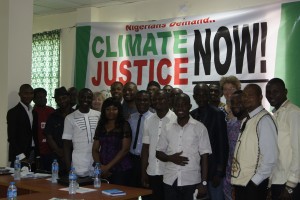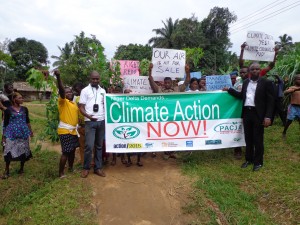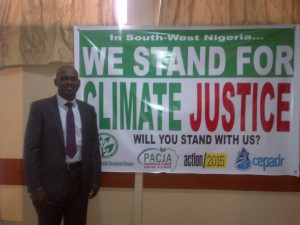We, the representatives of Nigerian Civil Society under the aegis of Climate and Sustainable Development Network of Nigeria (CSDevNet) held nation-wide consultations and mobilisation meetings on the imperatives of Climate Justice and Post-2015 Agenda as well as draw strategies and action plans for a robust participation in COP 20/CMP10. The meetings which took place from the 15th to 20th of November 2014 across the six regions in the country drew participants from Government, CSOs, Media, International Development Partners, grassroots community practitioners, trusts, farmer cooperatives, federations of slum dwellers and pastoralists, home based caregivers, youth, women and faith-based organisations, including those working on child welfare, the elderly, disabled and those focusing on livestock and animal welfare.

Recognising: the role of Nigeria to speak with one voice along with other African countries at the forthcoming Lima COP 20 and desirous that this one voice should be that of and be informed by realities of the local communities; and the fact that non-state actors contribution to the UNFCCC process and its outcome is essential for informed policy formulation and monitoring of its implementation at all levels;
Acknowledging: that these meetings held at a time that the world is expressing its deep solidarity with the families of the abducted Chibok schoolgirls and the people of North-East Nigeria, we hereby join the global call for solidarity and compassion with the Chibok families and we say “Bring Back Our Girls, Now and Alive”!
Affirming: the authority of the Nigerian Civil Society and communities, as the expression of the sovereign will and voice of the people;
Concerned: that Africa which contributes the least to the cause of climate change now suffers the most compared to other regions of the world;
Noting: the release of the Synthesis Report of the IPCC’s 5th Assessment Report that cited evidence of increasing warming globe and its devastating impacts in Africa and Nigeria in particular;

Expecting: that the UNFCCC-COP 20 in Lima will produce the first draft of the Post 2020 Climate Agreement that should be adopted as legally binding Climate Change Treaty during the UNFCCC-COP 21 in Paris by 2015 and that this treaty will be responsive to the climate change challenges in Nigeria;
We hereby declare and adopt the following as the Nigerian position for LIMA COP 20:
Finance
Developed countries must begin to manifestly honour and deliver on their promises of providing $100 billion a year by 2020. In line with the Warsaw decision on finance, annex 1 countries must now scale up their pledges to fulfil their obligation to provide adequate, new and additional funds as this amount is far from all estimates of climate finance needed by developing countries.
As COP 20 beckons in Lima, developed countries should pledge at least $20 billion in grants towards the initial resource mobilisation of the Green Climate Fund. We consider it as vital that these pledges are announced before the COP so they do not become part of the bargaining in Lima.
Adaptation
Climate change, if not addressed in time, is expected to exacerbate Nigeria’s current vulnerability to weather swings and limit its ability to achieve national aspirations. We therefore call on our government to build resilience and define priority adaptation actions, building on the 2011 National Adaptation Strategy and Plan of Action on Climate Change (NASPA-CCN).
Agriculture as a major contributor to global greenhouse gas emissions still reels under the warming effect of climate change especially in developing countries through higher temperatures, greater demand for water for crops, more variable rainfall and extreme climate events such as heat waves, floods and droughts. We therefore call for concerted action and climate resilient mechanisms and strategies that will strengthen food security, adaptation and mitigation as well as contribute to sequestering greenhouse gas emissions and capturing carbon in the soil.
Adaptation efforts should systematically and effectively address gender-specific impacts of climate change in the areas of energy, water, food security, agriculture and fisheries, biodiversity and ecosystem services, health, industry, human settlements, disaster management, and conflict and security.
Developed countries must compensate Nigeria in particular for the full costs of avoiding harms, actual harms and damage, and lost opportunities for our development resulting from climate change. We oppose any efforts to establish adaptation as an obligation not a right, or to use adaptation as a means to divide or differentiate between developing countries.

Loss and Damage
The establishment of an international mechanism to provide expertise to help developing nations cope with loss and damage caused by climate impacts will remain an exercise in tokenism until the mandate and scope of the mechanism are strengthened to meet the needs of the vulnerable. In agreeing to establish a loss and damage mechanism, countries have accepted the reality that the world is already dealing with the extensive damage caused by climate impacts, and requires a formal process to assess and deal with it, but they seem unwilling to take concrete actions to reduce the severity of these impacts
Technology Transfer
Developed countries must remove intellectual property rights, pay full incremental costs of technology transfer to protect developing countries and contribute for peaking and declining of global emission. We oppose efforts to sell rather than transfer appropriate technologies, or to strengthen rather than relax intellectual property rights. Developed and developing countries should support the adoption and development of indigenous and locally innovated technology as well as ensuring efficiency in technology transfer and deployment.
Mitigation
Developed countries must commit to cutting their domestic greenhouse gas emission to keep with the IPCCC AR5 and to keep global warming well below 1.50C to peak by 2015 and decline thereafter to at least 80% below 1990 levels by 2050.
Developed countries should provide financial and technical resources for clean, accessible, sustainable energy, low-carbon development and the implementation of effective, pro-poor adaptation measures in Nigeria.
Post-2015 Agenda
We believe that the year 2015 is critically important as processes that will potentially shape development frameworks across the globe will be concluded by 2015:
- Negotiations for the new Climate Change treaty under the United Nations Framework Convention on Climate (UNFCCC)
- Negotiations for the new development framework to succeed the Millennium Development Goals (MDGs) spearheaded by the United Nations.
We view the aforementioned processes as inter-related and dependent on each other. Sustainable Development Goals cannot be attained if the global community fails to heed the recommendations by science and act decisively on climate change. At the 2012 Rio+20 Conference, all countries agreed that climate change is a major obstacle to sustainable development and poverty eradication.
This is supported by the experience of people living in poverty and vulnerability and major UN reports feeding into Post-2015.
Science further underlines the immediate need for action in all areas including international development. The urgency for action is underpinned by climate science and the window of opportunity for avoiding dangerous climate change is rapidly closing.
The Post-2015 Framework must therefore help to make climate action in all countries happen without further delay and must support poor people, particularly in Africa and Nigeria to build resilience so as to adapt to climate impacts they are experiencing already.
The post-2015 framework should address all risks and hazards, both natural and human-made, including conflict. Moreover the framework must be part of, not separate from other development and environmental frameworks so that disasters, development, poverty and climate change are strategically integrated, particularly at the community level. The framework should be underpinned by the four guiding principles agreed at the Global Platform for Disaster Risk Reduction 2013: inclusion, equity, people-centred and environmental sustainability.
The post-2015 framework should prioritise support to high-risk countries like Nigeria and populations disproportionately impacted by natural and human-made hazards and disasters.
The post-2015 framework should provide strategic guidance for the redirection of resources from post-disaster recovery towards disaster risk reduction and sustainable development that addresses underlying causes of disasters risk.
The post-2015 Agenda should prioritise high frequency, low-severity weather-related disasters, particularly in African countries and areas of insecurity, insurgency and fragility.
With many countries, cities, and states billed to hold elections this year and next, Civil society calls on citizens of such countries to pile up pressure on their aspirants until climate change becomes embedded in their manifestoes, not just as an environmental issue but a political agenda necessitating urgent attention of all.
Climate action bordering on climate-smart agriculture, re-shoring the economy, sustainable land planning, alternatives to the car-culture, energy sobriety, eco-housing, ethical finance, social and environmental conversion of manufacturing, ethical consumption, a new share of wealth and work, community support, waste reduction and recycling, preservation of common goods such as water, soil, and forests should be on the front burner as 2015 beckons.
With a membership of over 50 organisations cutting across the six geo-political zones in Nigeria, Climate & Sustainable Development Network of Nigeria (CSDevNet) brings together organisations, comprising grassroots community practitioners, trusts, federations of slum dwellers and pastoralists, home based caregivers, youth, media, women and faith-based organizations, including those working on child welfare, the elderly, disabled and those focusing on livestock and animal welfare, to commonly promote and advocate pro-poor, climate-friendly and equity-based responses to climate change.
CSDevNet aspires to unify and coordinate isolated civil society efforts on climate change advocacy in Nigeria to ensure that people-centred response mechanisms are accorded desirable attention and relevance as climate change is increasingly mainstreamed in national and global poverty reduction and sustainable development strategies and actions.
